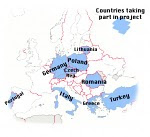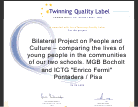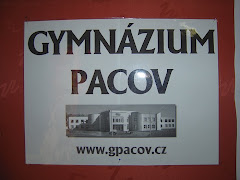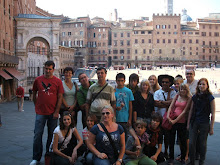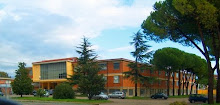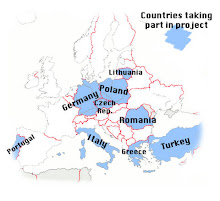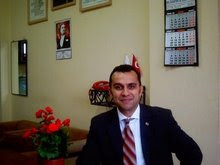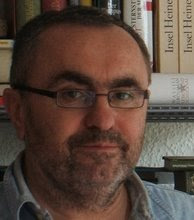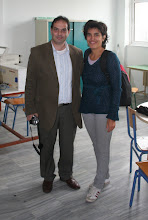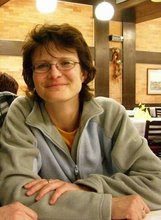COMENIUS E' UN BRAVO INSEGNANTE – Abbiamo avuto l'opportunità di vivere una esperienza formativa di grande rilievo che ha permesso di incorciare le conoscenze personali con quelle dei colleghi di altri paesi, l'opportunità di conoscere direttamente il territorio, la cultura della Repubblica Ceca, la situazione politica, economica, sociale di questo Stato. Nel corso del viaggio, attraverso l'esercizio continuo della lingua inglese ed il confronto tra le lingue dei partecipanti: portoghesi, tedeschi, polacchi, rumeni, lituani, greci, turchi, abbiamo ampliato le nostre conoscenze linguistiche.
Si può dunque affermare che questo progetto, se per gli studenti coinvolti rappresenta senz'altro uno dei più efficaci strumenti di crescita culturale e di incontro con l'idea di un'Europa veramente unita, pur nelle diversità linguistiche e culturali, per gli insegnanti rappresenta uno strumento di formazione, aggiornamento e approfondimento fra i migliori che si abbiano a disposizione.
IMPARARE GIOCANDO – L'esperienza si configura come una scuola full time che coinvolge pienamente i singoli partecipanti nei suoi workshop, nelle visite a musei, città, monumenti, centri di ricerca, industrie, laboratori artigiani. Sapersi comportare in ogni occasione, sapere cosa dire, lavorare insieme, mettere in comune le proprie conoscenze... il tutto, in un progetto come questo, avviene senza che i partecipanti avvertano alcuna fatica perché stimolati da una situazione appassionante.. come il gioco.
Comenius quindi, dal punto di vista formativo e pedagogico, verifica appieno la validità di quella antica intuizione di Tommaso Campanella che vedeva in questa strategia educativa uno strumento veramente efficace di apprendimento e di crescita.
L'EUROPA UNITA – per comunità si intende un gruppo di persone che siano intimamente legate da reciproci vincoli di amicizia e di scambio intellettuale. I soggetti coinvolti in questo progetto: studenti, docenti famiglie di diversi paesi,
stabiliscono dei legami forti che hanno una loro vita al di là dell'incontro e che fanno desiderare altri incontri, altre esperienze.
Comenius è dunque un ottimo strumento per contribuire alla costruzione di una comunità europea di persone.
IL VIAGGIO E LA CONOSCENZA - Pacov è una cittadina della Boemia. Pacov, come tutte le città ceche è composta di una parte vecchia/nuova e di una parte nuova/vecchia. La parte vecchia/nuova rappresenta il centro “naturale” sorto spontaneamente e rinnovatosi nei secoli nell'area più strategica dal punto di vista economico e sociale: ovvero lungo una via importante di collegamento, intorno alla piazza utilizzata per gli scambi commerciali e, al contempo, alveo dei rapporti sociali della famiglie e delle strutture istituzionali: chiesa/comune etc.
Questa parte storica nelle città ceche era stata in gran parte abbandonata per far nascere i centri nuovi costituiti dai pannellak, palazzi costruiti con pannelli di cemento, dove le famiglie avrebbero vissuto il mondo nuovo costruito dal comunismo, perdendo il contatto con le proprie radici storiche, dimenticando la realtà sociale stratificata di un tempo sottolineata anche dalla diversità degli edifici che ospitavano le famiglie dei diversi livelli sociali, per far vivere i cittadini in una realtà finalmente egualitaria.
Oggi questi centri storici tornano ad essere il cuore pulsante della città mentre i pannellak spesso ospitano le famiglie di etnia e cultura zingara che, un tempo, il regime aveva forzatamente costretto a risiedere nei centri vecchi per sopprimere la cultura nomade e accelerare il degrado dei centri storici.
IL GINNASIO DI PACOV – La nuova scuola si mostra ben organizzata negli spazi interni, estremamente pulita, attrezzata di tutto ciò che può servire nei diversi laboratori. Ordine, pulizia, disciplina sono frutto non di una rigida azione disciplinare messa in atto dalla direzione, ma il frutto del comportamento spontaneo degli allievi, dei docenti, del personale amministrativo e di supporto.
Gli allievi che arrivano a scuola, abbandonano negli spogliatoi giacche e borse, indossano, come avviene comunemente nelle rispettive case, le ciabattine, vivono in una dimensione familiare, come se la scuola fosse la loro casa e gli altri, compagni e docenti, un'altra famiglia con la quale è piacevole vivere e soprattutto lavorare.
LA REALTA' PRODUTTIVA AGRICOLA E INDUSTRIALE – La visita ad una azienda agricola di Pacov, con un grande allevamento di mucche e la produzione di latte (stalle e laboratori sono automatizzati) e con una attenzione particolare per l'ecologia ha dato un'idea dell'impegno forte lo sviluppo di un'agricoltura verde che caratterizza la Repubblica Ceca.
La visita al Birrificio Bernard nella cittadina di Humpolec ha confermato come la via per lo sviluppo economico, scelta dalla Repubblica Ceca, sia quella del prodotto tipico tradizionale e dell'impiegio delle più moderne tecnologie e di ua forte azione di marketing per potenziarne produttività e qualità.
ORGOGLIO DI UNA EREDITA' CULTURALE DI IDENTITA' – L'Europa, in epoca nella quale sembra prevalere un processo di globalizzazione, difende le peculiarità culturali dei suoi popoli. Il popolo ceco è estremamente orgoglioso delle sue peculiarità culturali e delle radici storiche dalle quali queste sono originate. Lo spirito esemplato dai versi altissimi della Canzone della Moldava o, in un registro più basso, nell'invezione del Buon Soldato Svejk sono stati presentati in ogni occasione e soprattutto nel corso della visita a Tabor, città egualitaria fondata dagli Hussiti. Tabor è la città simbolo dell'alto livello di cultura, progresso e libertà di pensiero che ha caratterizzato per secoli il popolo ceco.
L'INDUSTRIA TURISTICA – La visita a Cesky Krumlov è stata l'occasione per toccare con mano l'intraprendeza di un popolo che è riuscito a risollevarsi da uno stato di profonda povertà riuscendo a far rinascere le sue città, puntando sul Patrimonio materiale e immateriale come risorso chiave per lo vìsviluppo economico.
Un impegno che è stato premiato dall'UNESCO che ha incluso nella Lista del Patrimonio molte città ceche tra le quali anche l'affascinante Cesky Krumlov.
Questo visita mi ha offerto l'occasione di spiegare al gruppo che cosa sia l'UNESCO, quale sia la sua struttura, quali i suoi interventi nel mondo, quali gli ideali che propugna, sguendo l'impegno alla divulgazione della conoscenza di questa Agenzia e dei suoi ideali che ho assunto, ormai da molti anni, in qualità di Presidente del Club UNESCO di Lucca e fondatore di molti Club UNESCO in Italia come il Club UNESCO di Pisa.
PRAGA – La visita a Praga ha offerto l'opportunità di cogliere, in modo ben definito, la vera essenza di questa nazione. La Repubblica Ceca è senz'altro il Cuore dell'Europa, qui si incontrano, si riassumono, la storia e le diversità culturali del continente: ebraismo, cattolicesimo, protestantesimo, cultura slava, cultura tedesca, influssi mediterranei, qui tutto è presente e tutto si fonde.


















